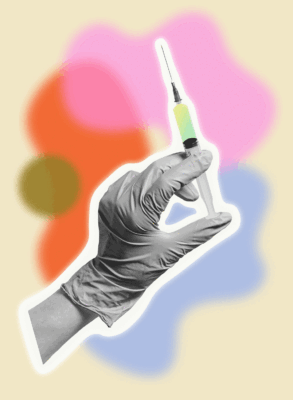Editor’s Note: Our Betty’s team was lucky (actually the luckiest!) to have Claire on the team as one of our Content Creative interns through the Students and Startups summer program. Over the course, Claire was a content machine – writing blogs, creating graphics, shooting Tik-Toks – an essential asset as we launched Betty’s Care in July. The following is her personal story written during the last week of her internship, reflecting on her own experience with her body, her period, and women’s health, plus how her internship with Betty’s Co. has reinforced the changes she sees are needed in the women’s healthcare space. Following her story, our Care Provider weighs in on heavy bleeding – how to identify abnormal menstrual bleed levels, what you can do about it, and what treatment options you might have.
The first time I got my period, it was like a birthday celebration no one wanted. My mom sarcastically uttered, “Welcome to womanhood!” under her breath while I gaped down at my now-scarlet, children’s underwear. It must go downhill from here, I thought to myself as I grabbed a winged pad and slapped it into my panties.
And to be honest, it took me a long time to embrace and learn to manage my period. For one thing, I spent my first two years of menstruation bleeding through every single outfit I had. You read that right. Not just the pad and underwear, but the clothes, too. I distinctly remember discovering a huge splotch of blood on the backside of my skirt in the mirror of my 8th grade locker room. I panicked. It was 95 degrees outside, a scorcher of a Texas day and the only option to hide my “womanhood” was the peach-colored, Sherpa-lined coat that’d been left behind in my locker last winter. I grabbed it and tied around my waist. Tell me why even my teachers made fun of me that day.

The excessive bleeding continued and became an ongoing issue for me, one that prompted a very early prescription for birth control. In middle school, I couldn’t get through a SINGLE class without soaking through an OVERNIGHT, super maxi-pad. It was embarrassing and scary, I felt helpless during those days and feared everyone was going to “find out.” Between my freshman and sophomore years, my body bled for nearly five months straight.
After several, questionable gynecological visits – including one where the doctor quite literally told me the magical “cure” for my heavy bleeding was a strict regimen of 10 supplements per day, I finally found a provider who listened to me. She didn’t dismiss my symptoms, adjusted her tone and language so I could understand. As a side effect of the bleeding, I became severely anemic, but she took the time out of her hectic schedule to explain the risks and treatment options available.
When I think back on my “period journey”, I’m alarmed by just how much I didn’t know about myself or my body. For the longest time, I couldn’t figure out tampons (which, let me tell you, puts a real damper on summer plans when all mine included swimming).

“These are impossible,” I told my mom, shaking a tampon. “My body isn’t cut out for this.”
And while tampons didn’t agree with me, the truth is, I was really, really uncomfortable with my body and my “down there” region.
My parents loved, protected, and cherished me, raising me to cherish and take similar protection over my body. But the emphasis put on guarding the “down there” parts of it left me uncomfortable and unwilling to learn my own self. It became something I should never show anyone, including myself.
For how miraculous the female reproductive system is, we speak very little about it. Talking about our bodies, our cycles, our health is taboo, it’s “in-poor-taste.”
And unfortunately, in my experience, the opposite sex wasn’t always to blame for creating the stigmas that caused me to feel uncomfortable about my body. During my senior year of high school, I dropped my bag and a flood of pads and tampons scattered across the floor of the library. As I frantically shoved the evidence back into my bag, a group of girls in my grade stood nearby, gawking and audibly laughing at me. These girls, my menstruation peers, were actively taking part in generating that period shame – a process they, too, were experiencing. We must do better.

This pattern of secrecy and mystery around periods is reinforced with every new generation of young girls who don’t *really* understand their bodies. For all its inaccuracies, I still count my blessings for the internet, because I can’t imagine how my mother or my grandmother managed without the same access.
Which is why I trust Betty’s.
Betty’s Co. is the resource I wish I’d had during those transitionary years. The education they provide is the information I wish had been easily and discreetly there at my fingertips. The normalizing they promote is the encouragement I wish had been close by, as a reminder that I wasn’t alone in my experience. I wish my first experience had been under the care of their providers, who demonstrate care should be personalized to me, not the other way around.
Betty’s has created the space for open and honest discussions about women’s health not shrouded in shame. It’s here that younger, worried Betties, who are trying to adjust to the changes in their bodies, can feel safe. Betty’s Co. is the next generation of healthcare.

ACOG (The American College of Obstetricians and Gynecologists) defines abnormal uterine bleeding as “flow outside normal volume, duration, regularity or frequency of bleeding.”
So what is “normal?”
Typical cycles are five days every 21-35 days. Bleeding can widely vary, but over 80ml of bleeding is considered outside of normal volume.
What does 80ml look like?
Regular tampons hold 5ml, super tampons hold 12ml. Pads are similar, holding 5 ml for regular daytime pads and 10-15ml for overnights.
What other symptoms might indicate heavy bleeding?
Heavy menstrual bleeding can cause anemia, a condition in which there is a lack of healthy red blood cells to carry oxygen to the body’s tissue. Anemia can cause symptoms such as dizziness, fatigue, lightheadedness, fast heartbeat, brittle nails, headaches, and in severe cases, pale skin color, chest pain, shortness of breath, or weakness. If left untreated, anemia can become severe over time. If you are experiencing any of these symptoms, it’s important to see a provider.
One way your provider will evaluate your bleeding is by asking how long and frequent your cycles are, as well as how many pads and tampons you are changing with each day of your cycle. If you feel like your bleeding is heavy, keep track of this at home and talk to your doctor.
Is heavy bleeding treatable?
There are lots of treatment options for heavy bleeding. Sure, birth control pills are one of those options. But depending on the cause, there may be other ones, too! Talking to your doctor about the nature of your bleeding, health history, and running a few simple tests will help direct the best option for you.
Texas-based Betties, if you have questions or concerns about your cycle, BOOK a Care Anywhere appointment! Our provider can assess if your bleeding is abnormal and talk you through your options to keep your menstrual bleed levels in the normal range.








Join the conversation